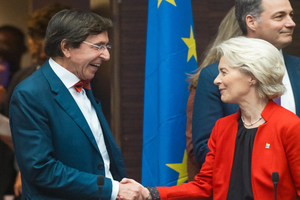News
Belgian Presidency: cohesion policy and political declaration "A European policy fit for the future"
February 2024
Cohesion policy at the heart of discussions
An informal meeting of the ministers responsible for cohesion policy was held in Mons on the 5th and 6th of February. Chaired by the Minister-President of Wallonia, Elio Di Rupo, the meeting brought together the ministers responsible for cohesion in the Member States, as well as the European Commissioner for Cohesion and Reform, Elisa Ferreira, the European Commissioner for Employment and Social Rights, Nicolas Schmit, the President of the REGI Committee of the European Parliament, the President of the European Economic and Social Committee, and representatives of the European Committee of the Regions and the European Investment Bank.
Its aim: to discuss the future of cohesion policy in Europe. "Prior to the publication of the 9th report on cohesion, the finalisation of the work of the high-level group on the future of cohesion policy and the Cohesion Forum, as well as the debate on the 2024-2029 strategic agenda, the Belgian Presidency invites Member States to discuss their strategic vision for post-2027 cohesion policy". For Elio Di Rupo, Minister-President of Wallonia: "Cohesion policy is an essential policy that must remain at the heart of the European project".
More info
Declaration of the Belgian Presidency "A European policy fit for the future"
Ahead of this meeting, a political Declaration was signed on January 24th, 2024 in Brussels as part of the Belgian Presidency of the Council of the EU: "Brussels Declaration of European Mayors: A European policy fit for the future".
To integrate urban matters more effectively within all relevant European policies and institutions and to increase the involvement of local governments in EU policy and decision-making processes, it presents six concrete recommendations to the European institutions:
- Systematic and more structured, binding dialogue and involvement of local governments at European level
- Better integration and coordination of urban matters on a European level
- More urban-friendly EU regulations
- More accessible and urban-friendly EU funding
- Promotion of metropolitan governance. In particular: Recognise the role of urban and metropolitan areas in cross-border locations and strengthen them as they face particular challenges.
- A Paradigm Shift: envision a new sustainable model that includes appropriate indicators and enables the transition towards just, productive and green cities

